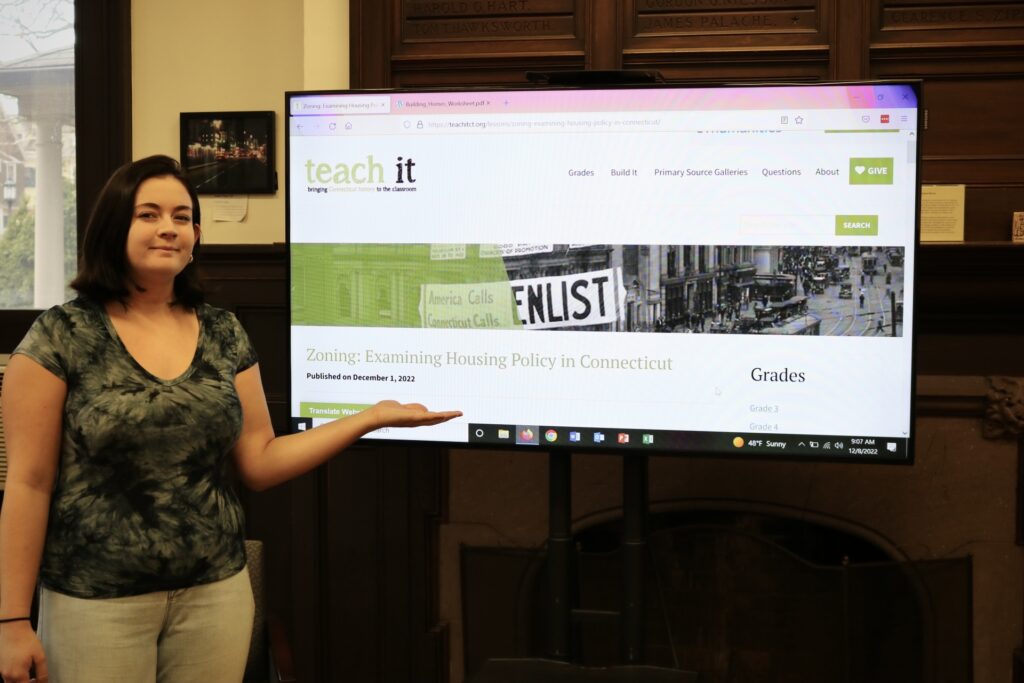Trinity Student Publishes High School Lesson Plan about Zoning Policy
A lesson plan designed by Trinity College urban studies major Victoria Asfalg ’23 will help Connecticut educators teach high school students about the history and impacts of zoning policy.
The plan was published in December by Teach It, a Connecticut Humanities program that provides the state’s teachers with instructional resources focusing on local history.
Asfalg, of Rocky Hill, Connecticut, began work on this lesson plan as part of an assignment for the Trinity educational studies course “Cities, Suburbs, and Schools,” taught by Professor of Educational Studies Jack Dougherty during the spring 2022 semester.

“I’ve always been passionate about equity,” Asfalg said about why she chose zoning policy as the topic of her lesson plan. “I took ‘Race and Urban Space’ [taught by Davarian L. Baldwin, Paul E. Raether Distinguished Professor of American Studies] earlier at Trinity and learned about zoning and the impacts of exclusionary zoning, including in the context of Connecticut.”
Zoning, as Asfalg’s project defines it, is “the practice of designating areas of land for certain uses. Exclusionary zoning is the practice of using zoning to prevent certain groups of people from having access to certain areas.”
“I think zoning is one of those things that not many people know about,” Asfalg said. “It’s an important part of how society is shaped: what buildings can go where, how big they can be, where a supermarket can open—it affects so much. Teaching students about this will make them more aware of the influences that shape their world.”
Each student project in the course was reviewed by Rebecca Furer, program consultant for Teach It, who invited Asfalg to further develop and publish her project. “When I heard Victoria’s presentation about exclusionary zoning in the spring of 2022, I was impressed by her efforts to take a really complicated topic and make it engaging for high school students through guided questions and hands-on activities,” Furer said. “I immediately thought it would make a great addition to Teach It because of the way in which it connected a historical topic to an issue that Connecticut still grapples with today.”
Connecticut Humanities awarded Asfalg a stipend from a grant to diversify topics in its current lesson plans as a way to recognize the time she spent on the project. Furer said, “To Victoria’s credit, she put in lots more work beyond what was expected for her class in order to respond to my questions and editorial comments and get the activity ready for publication.”
Asfalg developed three major components of the lesson plan: the ability to analyze a zoning map, complete an interactive activity on zoning, and analyze the historical influences of zoning. The plan also includes links to an introductory video and resources such as an interactive map, as well as a worksheet that Asfalg created. “It’s like a game with a little bit of math involved,” she said.
Dougherty, who has researched and written extensively about zoning, said that it is an important topic to teach local students. “Zoning is one of the most deeply contested issues facing Connecticut’s local governments and our state legislature. If we want future voters to engage with these debates, we need to teach about them in our public schools,” he said. “Victoria’s pedagogical insight was to translate complex zoning laws into a simple game. How many single-family versus multi-family homes can you place on a sample street? How do different zoning rules—such as minimum land requirements for single-family homes—make your decisions more or less inclusive?”
This year, Asfalg has served as a teaching assistant to Dougherty. Next semester she will launch an independent study project with a Hartford community partner on mapping change in the Parkville neighborhood.
“Working with eager learners like Victoria is the best part of my job at Trinity,” said Dougherty.
During her time at Trinity, Asfalg has worked at the Austin Arts Center, competed as member of the women’s rowing team, and volunteered through Trinity’s Homelessness Project with the local organizations Journey Home and Hands on Hartford.
After graduating in the spring, Asfalg will join AmeriCorps to serve as a tutor and mentor for students in New York City as part of a 10-month fellowship. Among her career options, Asfalg is considering both urban planning and education. “I love working with people, especially kids,” she said.
In the meantime, Asfalg said she is proud of her accomplishment with the zoning policy lesson plan and what it could add to local classrooms. “I’m thrilled that it might be useful to some teachers, and students might learn something more about where they live,” she said.
Learn more about educational studies and urban studies at Trinity.
